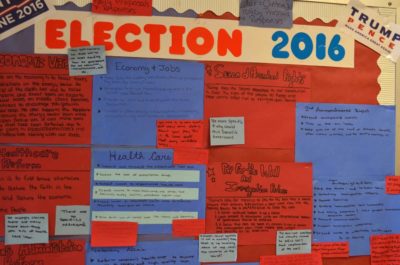The Thursday and Friday before last week’s big election, I drove up to McDowell Early College in Marion. It’s a rural community in Western North Carolina, situated on the campus of McDowell Technical Community College. McDowell County, of which Marion is a part, gave Donald Trump more than 70 percent of its vote in last week’s election.
Inside the early college, I sat in a classroom as students trickled in when they could to cast their votes for national, state, and local candidates. Some did so with skepticism; others in confusion. But many voted with enthusiasm and with thoughtful insight into why they were picking the candidates they chose.
One young man explained to me that he couldn’t stand either of the main candidates up for president, and so he was going for a third party. Another student told me how the process made him excited for when, in a few short years, he would be able to cast his vote for real. His only regret was that he hadn’t made the 18-year age cutoff for this election. He knew it was an important one.
This mock voting wasn’t limited to the campus of McDowell Early College, but rather was an experiment happening in schools across the state. That experiment was called First Vote NC.
Partnering with EdNC, Carolina K-12, and the NC Department of Public Instruction, First Vote NC (formerly Kids Voting NC) worked with educators to get their students involved, engaged, and ready to participate in American democracy. The core elements included an online voter platform, project-based lesson plans, free enrollment in Turbo Vote, an exit poll survey, and a data analysis forum.
After the smoke cleared from last week’s elections, the results came in on First Vote NC.
Seventy six high schools, 32,000 students, and almost half of all North Carolina counties took place in the virtual voting, according to a press release from First Vote NC. Another 74 middle schools also joined in, voting on national and state offices.
“We must turn the tide of civic disengagement and impress upon young people that the first step towards solving the myriad challenges their generation will face is to become knowledgeable and engaged participants in the civic life of our country,” said Hunter Buxton, executive director of First Vote NC.
You can see the results of the First Vote NC elections here: www.firstvotenc.org. In some cases our state’s students agreed with the voting population of North Carolina. In other cases, they didn’t. But you can see a breakdown of the results both statewide and by school.
In addition to voting for candidates for office, First Vote NC also posed specific questions related to demographic and civic engagement.
“Educators, students, and the public have an opportunity to see how this data correlates to election results, revealing how various factors like gender, future party affiliation, race, news sources, religious service attendance, your likelihood to vote, and parent voting behavior, might influence student voting,” the press release stated.
First Vote NC also asked two “statewide issue” questions.
Those questions were:
Should more life skills classes be included in the curriculum?
In the context of smartphones and computers, what is more important privacy or public safety?
According to the press release, 86 percent of the students said more life skill classes should be included in the curriculum, but students were almost perfectly split on the question of privacy and public safety when it comes to smartphones and computers.
The press release also said that schools can have a strong influence going forward on making sure that more of our young voters gets involved in our nation’s elections.
“Early estimates show that only 50 percent of eligible 18-to-29 year olds voted in this election,” the press release stated. “Schools, with leadership from civics teachers, can play a vital role in developing motivated and informed citizens who fully participate in the civic life of our state and nation.”



